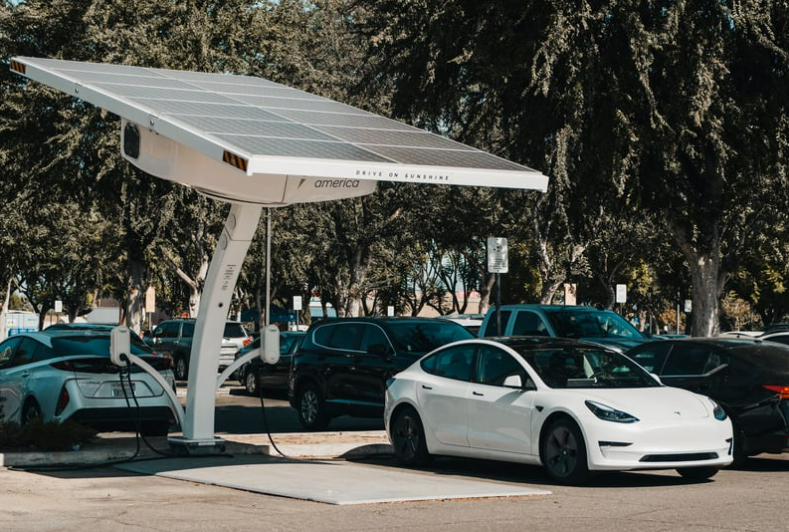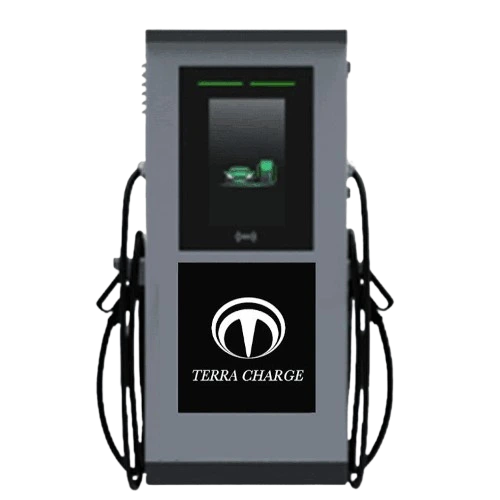Solar EV charging is when you use sunlight to charge electric vehicles. You install solar panels, which collect sunlight and turn it into electricity to power your car. It’s a way to save money on energy and help the environment by using clean, renewable energy from the sun to fuel your vehicle.
In this blog we will understand about the 7 Benefits that we get from Solar EV Charging and the different ways of powering your electric vehicles using solar energy.
Ways to Charge EV Using Solar Power
Solar energy offers numerous benefits when paired with electric vehicles. It saves money, supports the electric grid, and can even provide backup power to homes in the future.
Here are five ways your EV can be powered by solar energy:
- Rooftop Solar: Solar systems installed on rooftops can power both homes and EVs. These systems can be optimized to charge your car when you’re generating more electricity than you’re using, maximizing your solar savings.
- Solar-Powered Public Charging Stations: Some public EV charging stations have solar panels installed onsite. While it may be challenging to identify these stations through apps, exploring different charging stations can help you discover solar-powered options.
- Community Solar: Subscribers to community solar projects can use their portion of a shared solar array to charge their EVs at home.
- Vehicle-Attached/Added Photovoltaics: Solar panels can be added to the structure of existing vehicles to provide additional power to electrical systems.
- Vehicle-Integrated Photovoltaics: Solar modules can be seamlessly integrated into the design of vehicles, both mechanically and electrically, to directly power onboard systems.
Benefits of Solar EV Charging
- Cost Savings: Installing solar panels for EV charging can save money by reducing reliance on grid electricity, particularly in areas where solar power is cheaper than traditional electricity. This cost-saving benefit extends over time, as homeowners can potentially offset their initial investment in solar panels through reduced energy bills. Additionally, federal tax credits and other incentives further enhance the financial attractiveness of solar EV charging.
- Packaging Services: Pairing solar and EV charging simplifies installations, and benefits both customers and installers by reducing the need for multiple visits and increasing efficiency. Customers appreciate the convenience of integrating both systems into a single installation process, while installers can optimize their resources and streamline operations, ultimately improving customer satisfaction and loyalty.
- Incentives: With various incentives available for solar and EV ownership, customers are increasingly interested in adopting both technologies, driving future growth. These incentives may include federal tax credits, state rebates, utility incentives, and other financial incentives that make solar EV charging more accessible and appealing to consumers. By leveraging these incentives, customers can maximize their return on investment and accelerate the adoption of sustainable energy solutions.
- Peak Season Benefits: Solar EV charging can help offset high electricity costs during peak seasons, particularly in warmer climates, by utilizing stored solar energy instead of relying solely on the grid. This not only reduces electricity expenses for homeowners but also contributes to grid stability by reducing demand during periods of high energy consumption. By strategically managing energy usage, homeowners can optimize their solar EV charging systems to maximize cost savings and minimize environmental impact.
- Sustainability: By using solar power, EV charging reduces reliance on non-renewable energy sources like coal and natural gas, aligning with sustainability goals in the EV industry. Solar EV charging systems generate clean, renewable energy from the sun, thereby reducing greenhouse gas emissions and mitigating environmental pollution associated with traditional energy sources. This environmental benefit resonates with environmentally conscious consumers who prioritize sustainability and climate action in their purchasing decisions.
- Grid Independence: Solar EV chargers can operate independently of the grid, providing remote charging capabilities and enhancing resilience during power outages or emergencies. This grid independence allows homeowners to maintain access to electricity for charging their EVs even when grid power is unavailable, ensuring continuous mobility and energy security. Additionally, standalone solar EV chargers contribute to decentralizing energy production and promoting energy autonomy at the local level.
- Environmental Impact: Solar EV charging reduces carbon emissions and improves environmental health by utilizing clean energy directly from the sun to power electric vehicles. By displacing fossil fuel-based electricity with solar energy, solar EV charging systems help reduce air pollution, mitigate climate change, and protect natural resources. This environmental impact underscores the importance of transitioning to sustainable energy solutions and promoting eco-friendly transportation alternatives.
Conclusion
Solar EV charging presents a compelling array of benefits, including cost savings, sustainability, grid independence, and environmental impact reduction. These advantages make solar-powered electric vehicle charging an attractive option for homeowners and businesses alike, promoting a cleaner and more sustainable energy future.
FAQs
1. What are the benefits of solar EV charging stations?
Solar EV charging stations offer several benefits, including cost savings by reducing reliance on grid electricity, sustainability through the use of renewable energy, grid independence during power outages, and environmental impact reduction by lowering carbon emissions.
2. What are the advantages of solar charger?
The advantages of solar chargers include cost savings by utilizing free energy from the sun, environmental benefits through reduced reliance on fossil fuels, grid independence during power outages, and convenience of charging electric vehicles at home or on the go using renewable energy sources.
3. What is the advantage of charging an EV?
Charging an EV provides advantages such as cost savings compared to traditional gas-powered vehicles, reduced environmental impact by lowering carbon emissions, quieter operation, and potential incentives or rebates offered by governments or utilities for adopting electric transportation.
4. What are the benefits of solar energy vehicles?
Solar energy vehicles offer benefits such as reduced dependence on fossil fuels, lower operating costs due to free energy from the sun, decreased greenhouse gas emissions contributing to environmental sustainability, and potential grid independence through solar-powered charging solutions.












